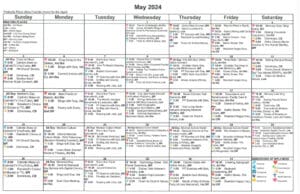First, kudos to you for recognizing it’s never too late to make a change, try something new, or otherwise enhance an area of your life.
Perhaps the most important thing to know is that change is a process. The more ready you make yourself for it, the easier it can be to follow through to successfully keeping your New Year’s resolution.
A few things to keep in mind:
Know Your Why. Write down why you want to make a particular change. Motivation is an important predictor of behavior, so be honest about your why. If your motivation for change isn’t important enough to you, you are less likely to stick with your 2024 resolution. Make note of how you want to feel when you achieve your resolution.
- Connect emotion to your why to strengthen your motivation and commitment to it: I’ll feel healthier and stronger and more confident when I strength train three days per week.
- Another strategy for strengthening your why is to link it to something (or someone) of importance to you: Taking this art class will teach me new skills and I’ll be able to socialize with my friends—and maybe make a new one!
Grant Yourself Patience and Kindness. Whether you’re adding a healthy habit like eating more fruit throughout the day or trying to reduce a poor habit such as smoking or watching too much TV, making a change takes about 6 weeks before the behavior becomes routine for you. Be patient with yourself. If you slip-up, intentionally or on purpose, be kind to yourself. Every moment, every day, is a chance to begin again and do better. Berating yourself will only make you less motivated to stick with your resolution. Be kind to you!
Do Set Goals. Don’t Aim for Perfection. Of course, you’ll set goals to guide your process during those six weeks and beyond. It’s also important to understand that making a behavior change involves more than just good planning. There will be emotional ups and downs, progress and setbacks that will be different for each person. Plan for success and be realistic about challenges you may encounter. Try to anticipate how you will handle challenges that pop-up (our list below can help with this). If you are moving toward your goals 80% of the time, you are doing great!
4 Tips to Help Older Adults Keep Their 2024 New Year’s Resolution
- Find Your Tribe. Enlist the support of loved ones, friends, and co-workers or a health/wellness coach. Working toward a New Year Resolution together provides social support that makes it easier (and more fun) to stick with making the change. When asking for support, you might start by talking with the people closest to you and letting them know what you are doing and why. You also can ask for specific help: When you see me reach for a third cookie, say something to me. Tell people what you need as you start and keep them updated as your progress toward your goal.
- Be Aware of Social Cues. If your bongo/board game buddies typically eat sweet snacks and your goal is to cut back on your sugar intake, you’ll need to make some changes to reduce temptation. Bring your own healthier alternatives to your games and invite everyone to take a 10 min walk between games.
- Have a Plan and Be Flexible. Anything you want to achieve isn’t about finding the time, it’s about making the time—and that’s a choice in your power. Look at your daily and weekly routines to identify blocks where you can exercise or prepare meals in advance. Making the time may mean waking-up earlier or reducing social media screen time to get moving. Block off those times in your schedule. Of course, life happens and there will be things that get in the way. Those are temporary shifts. Get right back to your routine the following day or as soon as possible.
- Celebrate Success! Incorporate a small reward for weekly successes and a bigger reward for milestones (e.g., 3 weeks of exercising daily, or sticking with a new art class) Rewards need not be expensive; rather, just them meaningful for you such as buying a new workout outfit or a higher quality set of paints and brushes).
5 Great Ideas for New Year’s Resolutions for Older Adults
The Golden Years can be a time of adventurous change for many older adults—and the New Year is the perfect time to embark on a specific change for yourself… check out these ideas:
- Move joyfully. Daily physical activity that you truly enjoy is easier to stick with and it is important for older adult health: moderately vigorous movement supports heart health, strengthens joints, and reduces the risk of injury from falls.
- Learn something new. Is there something you’ve always wanted to do, but never had the time for? A language, pickleball, bowling, or calligraphy? The New Year is a great time to learn something new.
- Make new friends, or spend more time with old ones. For older adults especially, loneliness and isolation has serious health concerns, including increasing risk of heart disease and stroke. Let 2024 be the year that you focus on friendship—making new ones or strengthening ties with current friends. If you’re struggling to meet people in your same stage of life, you might consider the benefits of living in a senior community.
- Sleep better. Sleep is essential for good health at every age. For older adults, a sound sleep routine supports the health of the immune system, the brain and nervous system (including concentration and memory), and metabolism. Getting restful sleep begins with your pre-bedtime routine and talking with your healthcare provider about any difficulties you are having with sleep.
- Get tech savvy. If you feel lost in the maze of new technology, help is out there! Try to learn and keep up with today’s tech by attending a program at a local library or asking a tech savvy grandchild to show you around a smart phone. With modern tech in hand, you have more opportunity to stay connected with family and friends, learn new things, and even make daily tasks a little bit easier for yourself.
Resources
Young, S., “Healthy Behavior Change in Practical Settings.” Perm J (2014, Fall) 18:4: 89-92, https://www.ncbi.nlm.nih.gov/pmc/articles/PMC4206177
NIH.gov, “Changing Your Habits for Better Health”, https://www.niddk.nih.gov/health-information/diet-nutrition/changing-habits-better-health
Medium.com, “10 Science-backed Tips to Making a Health Behavior Change that Sticks”, Posted by Paige Brown Jarreua,p https://medium.com/lifeomic/10-science-backed-tips-to-making-a-health-behavior-change-that-sticks-8655c3bbde50
APA.org, “Making Lifestyle Changes that Last”, https://www.apa.org/helpcenter/lifestyle-changes.aspx






